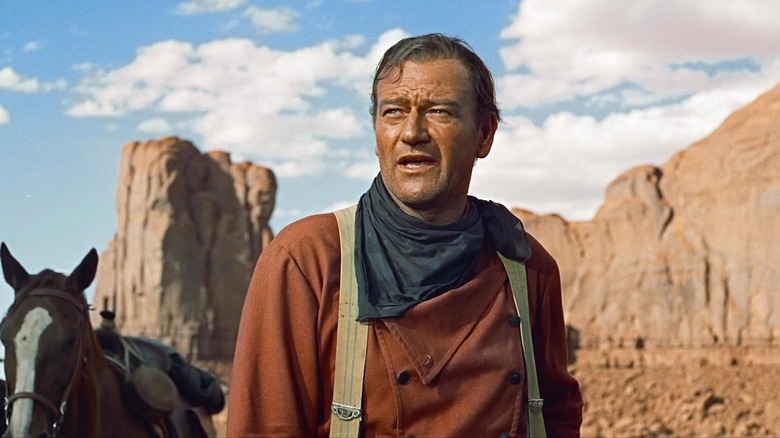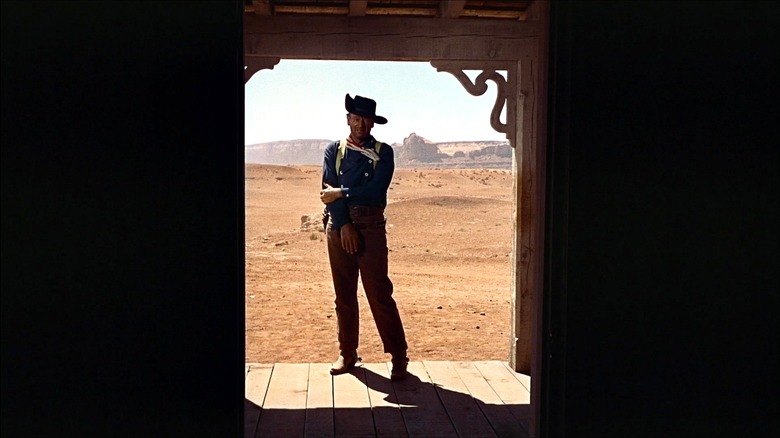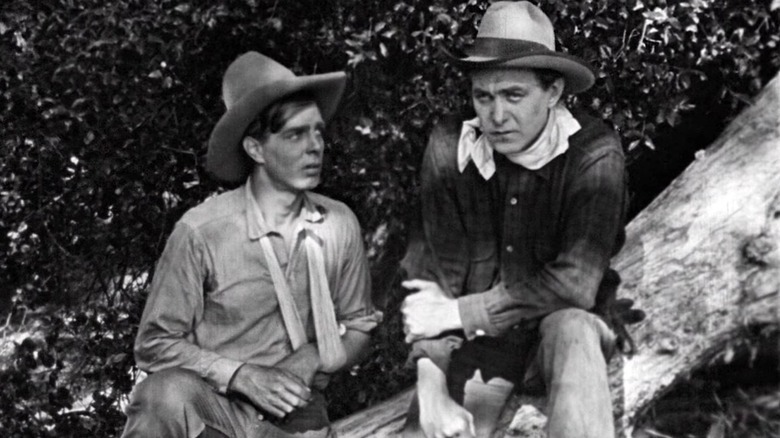John Wayne Snuck An Emotional Tribute Into The Searchers' Final Scene
We may receive a commission on purchases made from links.
Celebrity culture has been around since the advent of film. The stars of the silver screen become our heroes, and sometimes they transcend to become almost mythical heroes. John Wayne is one of those actors, a name that instantly floods your mind with specific images and characters. Wayne would become synonymous with the Western genre during Hollywood's classical film period and defined masculinity through memorable roles such as Rooster Cogburn in "True Grit," Sheriff John T. Chance in "Rio Bravo," and J.B. Books in "The Shootist."
Because he's so well known for his iconic tough-guy image, it's hard to imagine a young Marion Robert Morrison (Wayne's given name) looking up to a hero. And yet, the Duke tipped his hat and secretly told us in "The Searchers." John Ford's 1956 classic was groundbreaking in how it challenged the racist male heroes of early Westerns. The film stars Wayne as Ethan Edwards in what many consider his most memorable role. Edwards is not a strong, likable hero but rather a bitter, racist loner who is redeemed only in the final moments of the film.
And it's in those final moments that Wayne gave us a small unscripted gesture, allowing us a glimpse at his softer side and a clue as to who might've been the Duke's childhood hero.
Why John Wayne grabs his arm at the end of The Searchers
At the end of "The Searchers," the final shot has John Wayne standing in a doorway all by himself before turning to ride off alone (presumably into the sunset). The shot is brilliantly framed by director John Ford, with the interior of the house dark, emphasizing the solitude of Ethan Edwards' life as he walks away from what little family he has left.
In the scene, just before turning to leave, Edwards makes a very interesting gesture, and Scott Allen Nollen's book "Three Bad Men: John Ford, John Wayne, Ward Bond" describes how this unscripted moment from Wayne is an homage to a childhood hero — early Western star Harry Carey. As Nollen writes:
"[Wayne] was to look and then walk away, but just before he turned, he saw Ollie Carey, the widow of his all-time hero, standing behind the camera. It was as natural as taking a breath. Duke raised his left hand, reached across his chest, and grabbed his right arm at the elbow. Harry Carey did that a lot in the movies when Duke was a kid in Glendale, California. He'd spent many a dime just to see that."
It was beautiful in its simplicity, like the scene it occurred in. But the gesture was a nod to much more than Carey himself.
How Harry Carey impacted John Wayne, John Ford, and the cast of The Searchers
Before John Ford's relationship with John Wayne, there was Harry Carey. To put it in a modern context, it was like Martin Scorsese collaborating with Robert De Niro before his work with Leonardo DiCaprio. The pair collaborated on more than two dozen films, and Ford said that he learned a lot about the industry with Carey as his tutor. It was during these early days of the Western where Carey would develop his iconic arm pose where he grabbed his right arm with his left hand at the elbow. The gesture would permeate throughout Ford's films by other actors.
After Carey died in 1947, Ford would continue to cast Carey family members including Harry Carey Jr. Both Harry Jr. and Carey's widow Olive appeared in "The Searchers." And though the brief gesture might have been inspired by Carey's widow, it was felt far beyond the Carey family. As Nollen notes:
"Joseph McBride referred to Wayne's spontaneous, profound re-creation in 'The Searchers' as 'one of the most resonant gestures in the entire body of Ford's work, a gesture movingly encapsulating whole lifetimes of shared tradition.'"
It turns out the rough, tough cowboy John Wayne did indeed have a hero. He also showed his soft side in paying tribute to Carey, his family, and the Western icons that came before him.


